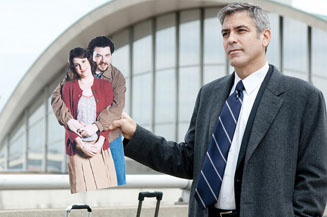Movie Review: Up in the Air
By Matthew Huntley
December 21, 2009
BoxOfficeProphets.com

George Clooney, in another charming yet honest performance, plays Ryan Bingham, a self-righteously efficient man who works for a company that's hired by other companies to fire its employees. According to Ryan, the only reason his job exists is because the bosses at those other companies are too chicken to lay off their employees themselves (only he uses meaner words).
When Ryan informs the employees their positions are no longer available, he tries to soften the blow by telling them this as an opportunity to do something else. Before he leaves, he hands them a packet and says he'll be in contact.
But Ryan won't be in contact, and I liked how the movie doesn't make him out to be a monster just because he's good at what he does. He's so good, in fact, that his job and lifestyle have become one of the same. He works and lives according to the idea that life shouldn't contain unnecessary weight. Ryan likes to live free. The only things he needs are his single bag of luggage, his suit and his wallet.
And this lifestyle seems to be working in his favor — he never has to wait in line at the airport; he doesn't keep any useless furniture in his near-empty apartment (he spends over 300 days a year on the road); and he gives lucrative self-help seminars in which he tells his audience to picture everything they own in a backpack and burn it, which is supposed to make them aware of how little they really need to get through life.
To his older sister (Amy Morton), Ryan doesn't exist, but she still asks him to take part in his little sister's wedding gift — to photograph a cardboard cutout of she and her fiancé (Melanie Lynskey and Danny McBride) at various locations around the country, "like the gnome in that French movie." Ryan agrees, but only out of obligation.
Yes, things are going well for him, and with the economy the way it is, Ryan's boss (Jason Bateman) tells him it's their time to shine. But Ryan's baggage-free lifestyle is suddenly threatened with the arrival of Natalie (Anna Kendrick), a hotshot new employee fresh out of Cornell, who proposes the company can cut costs by performing their jobs over the Internet. No more flights; no more Christmases away from home; no more extended leaves from family members. This worries Ryan, because it means he might actually have to endure staying put for a while, and to him, moving is living.
Before the transition begins, Ryan is instructed to show Natalie the ropes, and they embark on a cross-country journey together, in which she challenges him and forces him to reconsider how he lives. Her presence and personal conflicts draw him closer to Alex (Vera Farmiga), a traveling businesswoman who first flirts with Ryan as the two compare their frequent traveler's cards (in a truly lovely scene).
Writer-director Jason Reitman (Juno) tells this quirky human story in smart, zippy fashion and his greatest strength is his dialogue. It's fast and rhythmic, but also grown-up and mature. You get the sense the characters are having real conversations and their words don't exist merely to progress the story, but to reveal their innermost fears, desires and dreams. Reitman has written some intelligent, interesting people and I liked how the screenplay chooses to admire and respect them rather than undermine them. It pays attention to their eloquence and depth, and we listen intently because it actually has something to say about middle-aged adults being just as insecure and indecisive as young twentysomethings.
For as rich and progressive as most of Up in the Air is, the ending lost me a bit. It's not a bad ending per se, but I got a sense the film didn't have the courage to finish what it started — which is to show Ryan's modus operandi as the answer, or at least the answer for Ryan. I'm sure Jason Reitman feels strongly about his film's message, and it's his story to tell, but as a story, the ending feels traditional and safe when the rest of it seemed bold, unpredictable and uncompromising. There's even a blatant shot at the end when Reitman lays the pathos on a little thick as the film continues down a traditional path. Hollywood has been telling us to go down this path for a long time, and with a film as fresh and smart as Up in the Air, which seems destined to win awards, I was hoping it might challenge that ideal and tell us something different.